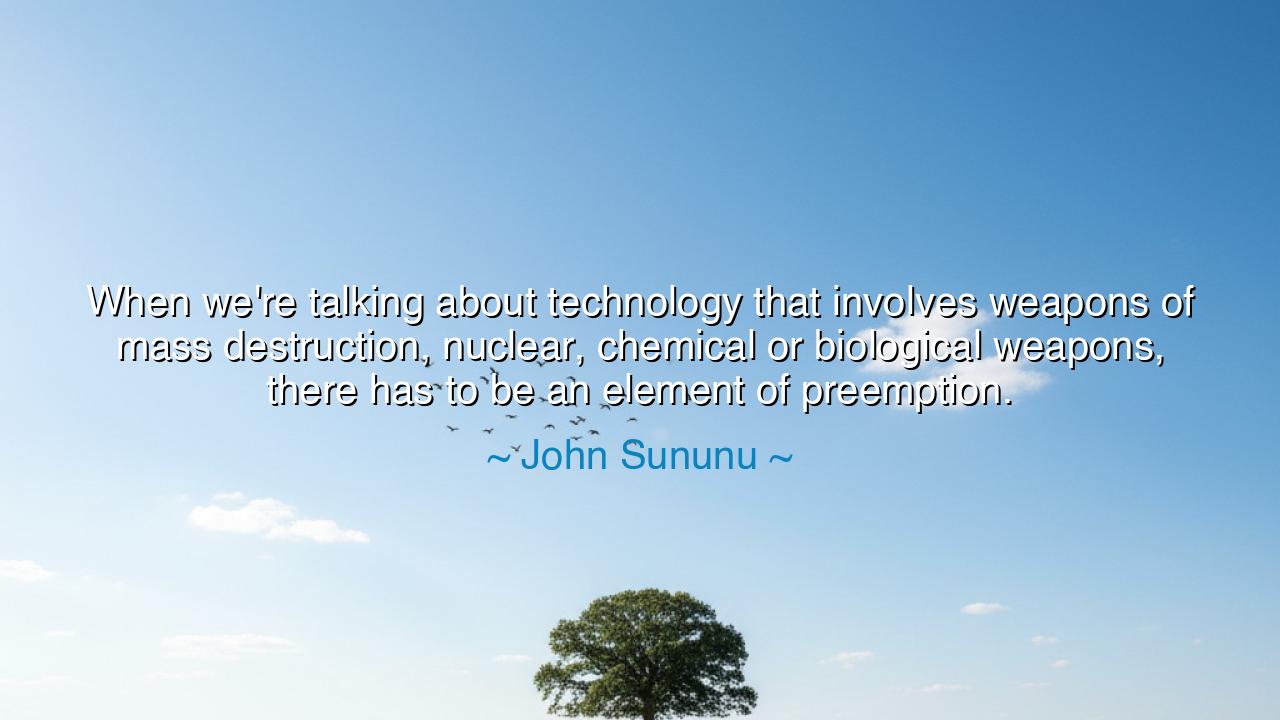
When we're talking about technology that involves weapons of
When we're talking about technology that involves weapons of mass destruction, nuclear, chemical or biological weapons, there has to be an element of preemption.






Hear the words of John Sununu, spoken with the gravity of one who knows the weight of nations: “When we’re talking about technology that involves weapons of mass destruction, nuclear, chemical, or biological weapons, there has to be an element of preemption.” These are not idle musings but a warning carved from the lessons of war and fear. For he names the truth that some forces, once unleashed, cannot be recalled. Against such destructive powers, patience alone is folly, and vigilance becomes the shield of survival.
The heart of his statement lies in the word preemption. To preempt is to act before calamity strikes, to guard against disaster not when it is upon you, but when it is only a shadow on the horizon. Sununu reminds us that with nuclear fire, with chemical poisons, with biological plagues, there can be no luxury of waiting. For when such powers are released, they do not wound one or a few—they devour cities, nations, perhaps even the whole of mankind. Therefore, foresight is not merely wisdom; it is necessity.
The ancients, too, knew this law, though their weapons were far less mighty. In Rome, the generals were taught that the best victory was to strike before the enemy gathered strength, to disarm the threat before it could march upon their gates. The Chinese strategist Sun Tzu wrote that the supreme art of war was to subdue the enemy without fighting, to prevent disaster before it began. What was true with swords and shields becomes doubly true with weapons that can destroy all in a single breath. The scale has grown, but the principle endures.
History gives us fierce reminders. Consider the Cuban Missile Crisis of 1962, when the world trembled on the edge of nuclear annihilation. The mere placement of missiles, not their use, was enough to provoke the U.S. to demand their removal, for leaders knew that to wait until the missiles were armed and ready would be to gamble with the survival of the earth. Or consider the Gulf War of 1991, where fears of chemical and biological weapons shaped every decision. Sununu’s words echo the lessons drawn from these moments: that vigilance before disaster is the only safeguard when the cost of inaction is unthinkable.
Yet there is more than strategy here; there is also morality. For weapons of mass destruction are not like other arms. A sword cuts one man, a cannon topples one wall. But nuclear and chemical weapons annihilate without discrimination—soldier and child, fortress and temple alike. To allow such tools to spread unchecked is to abandon the sacred duty of guardianship over humanity. Thus, preemption is not only a tactic of war but an obligation of conscience, a recognition that the preservation of life requires action before the abyss is opened.
But let us not mistake this teaching as a license for recklessness. Preemption must be guided by wisdom, not fear; by truth, not paranoia. For history also bears scars of those who claimed to act preemptively but instead sowed destruction unjustly. The balance is delicate: to act swiftly against real danger, but never to cloak ambition or greed in the mantle of necessity. The true path of preemption is born not of eagerness for conflict, but of reverence for life.
The lesson, O seekers of wisdom, is this: when faced with dangers beyond imagining, do not wait for certainty. Prepare, guard, and act before disaster grows too vast to control. In your own lives, though you may not face nuclear fire, remember the same principle: foresee the consequences of neglect, address problems early, and guard what is precious before it is too late. For in all things, from the affairs of nations to the struggles of the heart, preemption is the wisdom that prevents ruin.
So let Sununu’s words echo as a solemn teaching: “There has to be an element of preemption.” For when the stakes are nothing less than the survival of humanity, foresight becomes the truest form of courage, and action before disaster becomes the highest form of wisdom.






AAdministratorAdministrator
Welcome, honored guests. Please leave a comment, we will respond soon